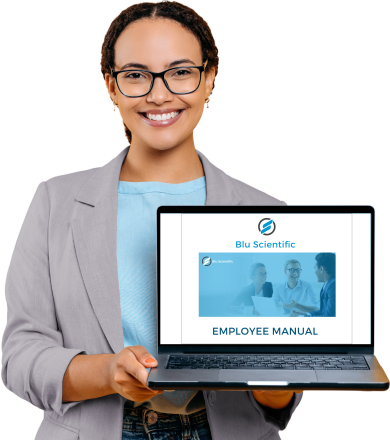“I love your products. You have done a truly fabulous job with your toolkits. I’ve just spent 3 hours customizing your toolkit for one of my clients, and what I’ve done already would have any senior management team ecstatic. Talk about return on investment!”
Why small businesses should avoid AI-generated HR templates
Why AI-generated HR templates can be a risk for small business.
AI-generated HR templates might seem like a quick and cost-effective solution, but they come with serious risks that small businesses can’t afford to overlook. While AI can generate generic policies, it doesn’t understand the complexities of employment law, HR best practices, or the real-world needs of a small business. The result? Documents that may be legally non-compliant, inconsistent, or impractical to implement.
Before relying on AI for HR, small business owners should consider the potential pitfalls. Here’s why AI-generated HR templates can create more problems than they solve:
-
Legal compliance gaps & liability risks
AI doesn’t specialize in employment law, and HR policies must comply with federal, provincial, and industry-specific regulations. AI-generated content often misses critical legal requirements, exposing businesses to lawsuits, penalties, or wrongful termination claims. -
Inconsistent & disconnected policies
HR documents should work together as a cohesive system. AI-generated templates are often disjointed, written in different styles, and may contradict existing company policies, creating confusion and potential legal exposure. -
No real-world HR expertise
AI generates content based on data patterns, not practical HR experience. It doesn’t understand workplace culture, employee relations, or best practices for handling sensitive situations like terminations, grievances, or performance management. -
Poor customization & irrelevant clauses
Many AI-generated templates include vague, overly broad, or irrelevant language that doesn’t reflect a business’s specific needs. Some policies contain legal jargon or corporate phrasing that isn’t suited for small businesses. -
No guidance on implementation
HR policies need to be properly introduced, communicated, and enforced. AI provides no direction on rolling out policies, training employees, or ensuring compliance, leaving small businesses without the support they need. -
Formatting & usability issues
AI-generated content often lacks clear headings, structured layouts, and readability. HR policies should be well-organized, easy to navigate, and visually polished—not raw AI output that requires heavy editing. -
Privacy & data security risks
Using AI to generate HR policies often requires inputting sensitive business information into AI models. This raises privacy concerns, especially if confidential company details or employee-related data are shared with public AI systems. -
No updates or ongoing support
HR laws and best practices change frequently. AI-generated templates don’t notify businesses when regulations change or provide ongoing updates, increasing the risk of outdated policies. -
HR is more than just documents
HR isn’t just about having policies; it’s about creating a structured system that supports business operations. AI-generated templates provide static text but don’t establish a connected HR framework for onboarding, performance management, or workforce strategy. -
Small businesses need HR that works for them
Small businesses have unique HR needs that differ from large corporations. Generic, AI-generated content doesn’t account for the specific challenges of managing a small team, handling flexible work policies, or navigating real-world HR situations.
The Bottom Line
AI-generated HR templates may seem convenient, but they leave small businesses exposed to legal risks, compliance issues, and operational inefficiencies. For HR policies that protect and support your business, it’s essential to use structured, expert-written documents that align with industry and compliance needs.

